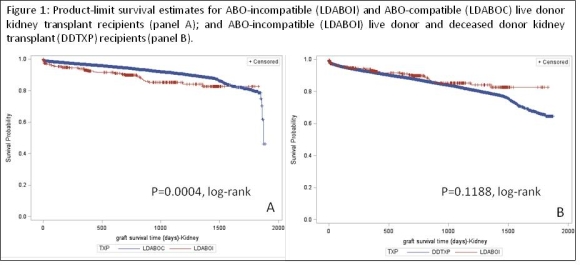ABO-Incompatible Live Donor Kidney Transplants Inferior to ABO-Compatible Transplants, but Match Deceased Donor Results: Is Kidney Paired Donation the Answer?
Georgetown University School of Medicine, MedStar Georgetown Transplant Institute, Kidney and Pancreas Transplant Program, Washington, DC.
Meeting: 2015 American Transplant Congress
Abstract number: 39
Keywords: Graft survival, Kidney transplantation, Outcome, Survival
Session Information
Session Name: Concurrent Session: Kidney Complications: Late Graft Failure
Session Type: Concurrent Session
Date: Sunday, May 3, 2015
Session Time: 2:15pm-3:45pm
 Presentation Time: 3:15pm-3:27pm
Presentation Time: 3:15pm-3:27pm
Location: Terrace IV
Objective: Compare kidney allograft survival in ABO-incompatible (ABO-I) and ABO-compatible (ABO-C) live donor kidney transplant recipients.
Methods: We analyzed UNOS database for patients who underwent a kidney transplant between 04/01/2008 and 03/31/2013. Kaplan-Meier and Cox modeling techniques were used to estimate survival.
Results: We identified 74,684 individuals who had their first kidney transplant during the five year period, of which 26,743 had a live donor ABO-C kidney transplant, 410 had live donor ABO-I kidney transplant and 47,531 had a deceased donor kidney transplant either from ABO-C or ABO-I deceased donor. Kidney allograft survival was inferior in ABO-I live donor compared to ABO-C live donor kidney transplant recipients (HR=1.69; 95%CI=1.26-2.28; p=0.0005; adjusted HR=1.64; 95%CI=1.22-2.21; p=0.0010). Graft survival was comparable when comparing ABO-C to ABO-I deceased donor transplants. Data were then compared for recipients of ABO-I live donor kidney transplant recipients to all deceased donor kidney transplant recipients. Graft survival for recipients of deceased donor kidney transplants was comparable to recipients of ABO-I live donor kidney transplants (HR=1.26; 95%CI=0.94-1.69; p=0.1201; adjusted HR=1.27; 95%CI=0.95-1.70; p=0.1108).

Conclusions: In the US national cohort of kidney transplant recipients, allograft survival in ABO-I live donor kidney transplants was inferior to ABO-C live donor kidney transplant recipients. However, kidney allograft survival in ABO-I live donor kidney transplant recipients was comparable to recipients of deceased donor organs. These findings validate our attempts to advocate for ABO-C paired donation prior to resorting to live ABO-I transplants. Kidney paired donation in ABO-I live donor-recipient pairs aimed to facilitate ABO-compatible transplants can improve allograft survival and patient outcomes.
To cite this abstract in AMA style:
Verbesey J, Cooper M, Gilbert A, Grafals M, Weems P, Moore J, Ghasemian S, Nilubol C, Javaid B. ABO-Incompatible Live Donor Kidney Transplants Inferior to ABO-Compatible Transplants, but Match Deceased Donor Results: Is Kidney Paired Donation the Answer? [abstract]. Am J Transplant. 2015; 15 (suppl 3). https://atcmeetingabstracts.com/abstract/abo-incompatible-live-donor-kidney-transplants-inferior-to-abo-compatible-transplants-but-match-deceased-donor-results-is-kidney-paired-donation-the-answer/. Accessed March 4, 2026.« Back to 2015 American Transplant Congress
